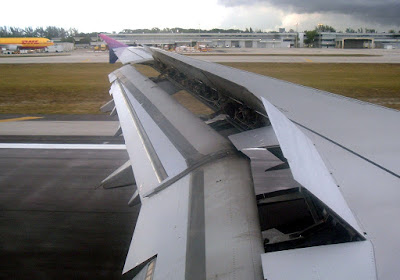Thrust Reverse System
When the plane is landing, the
difficulty of stopping increases with increasing weight and its speed varies,
so the pilot uses the “brake spoilers” and the “brake system” to reach the
plane to zero velocity and that is by changing the direction of the hot gases
coming out of the engine (thrust reverse system).
(Newton's second theory which states that each action has an equal and opposite reaction in the direction).
Also, the "Thrust
reverse" system can only be activated upon contact with the ground plane
through an electrical circuit present in the "Landing gears" called
(air / ground logic).
Spoiler "air brake"
The "Thrust reverse"
is located at the end of the engine and its functions are to:
1- Shorten the runway distance
on the runway
2- Reduce the load on the brakes
3- Improve braking control in
rainy or snowy climates
Mechanical blockage:
This type is by placing a
mechanical barrier that repels gases leaving the engine and changing its
direction at a certain angle, and this barrier is installed externally at the
end of the engine and this type is called "Clambshell thrust
reverse".
- Aerodynamic blockage:
This type is formed with flow
inhibitors inside the engine in the "gas steam" stream, close to the
outer hood. Side doors open in the engine and at the same time
"vanes" blades plug the "exhaust" outlet and hot gases exit
from these side vents.
Engine Thrust Reverse
Subscribe by Email
Follow Updates Articles from This Blog via Email



No Comments